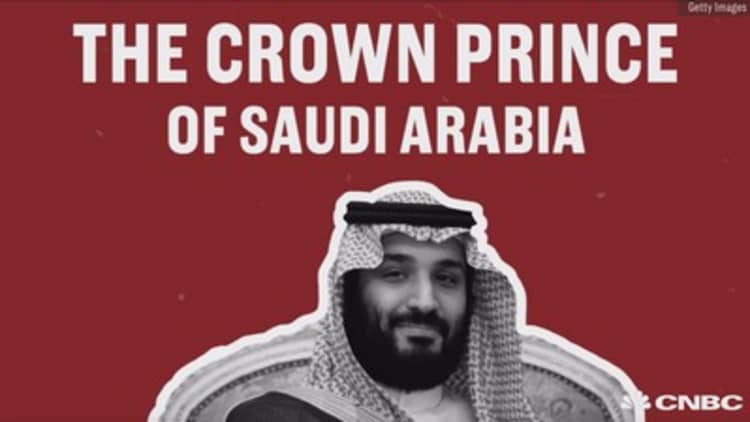Senate Foreign Relations Committee leaders Bob Corker, R-Tenn., and Bob Menendez, D-N.J., sent a letter to President Donald Trump demanding he address whether Saudi Crown Prince Mohammed bin Salman ordered the murder of journalist Jamal Khashoggi.
The letter, sent Tuesday evening, came hours after Trump declared in a statement filled with exclamation points that the U.S. would stand with Saudi Arabia as a crucial economic and national security ally, despite the kingdom's admission that Khashoggi had been killed inside the Saudi consulate in Istanbul on Oct. 2.
"In light of recent developments," Corker and Menendez wrote in the letter, "we request that your determination specifically address whether Crown Prince Mohamed bin Salman is responsible for Mr. Khashoggi's murder."
While multiple outlets reported that the CIA concluded with high confidence that the crown prince was directly involved in the decision to kill Khashoggi, Trump himself cast doubt in his statement: "Maybe he did and maybe he didn't!"
Sending the letter itself triggers an investigation under the Global Magnitsky Human Rights Accountability Act, which was signed into law during the Obama administration in 2012. Corker and Menendez note in the letter that if the president receives the request, he is required to "determine whether a foreign person is responsible for an extrajudicial killing, torture, or other gross violation of internationally recognized human rights against an individual exercising freedom of expression" within 120 days.
The White House did not immediately respond to a request for comment.
Corker, the committee chairman, and ranking member Menendez had already sparked a Magnitsky investigation on Oct. 10 regarding the death of Khashoggi, a Washington Post columnist and critic of the Saudi royal family.
That letter required Trump to decide on sanctions with "respect to any foreign person responsible" for Khashoggi's then-disappearance. A bipartisan group of senators, including South Carolina Republican Lindsey Graham, Democrat Chris Murphy of Connecticut and Florida Republican Marco Rubio, co-signed the letter.
The Trump administration last week did announce sanctions on 17 people allegedly involved in Khashoggi's slaying, including the overseer of the Saudi consulate where Khashoggi was tortured, killed and dismembered, according to reports citing Turkish officials.
Saudi prosecutors said they would seek the death penalty for five individuals allegedly involved in the killing.
But Trump released a bellicose statement Tuesday asserting that while the world "may never know all of the facts surrounding" Khashoggi's murder, "our relationship is with the Kingdom of Saudi Arabia."
The statement asserted that an "America First" worldview required the preservation of the strong U.S.-Saudi alliance cultivated during the Trump administration. He highlighted Saudi Arabia's role as an ally in Washington's increasingly hostile stance toward Iran, and as a partner in the fight against global terrorism.
Trump has been even more vocally supportive of the kingdom in the wake of his decision on Khashoggi. In a tweet Wednesday morning, he thanked Saudi Arabia for recent declines in oil prices, adding "Let's go lower!"
Congress knocks Trump
Trump's decision to support the Saudis was excoriated by politicians across the aisle.
"I am astounded at the type of response that was put out by the White House," Corker, who has been a critic of Trump in the past and is not seeking re-election, told an ABC affiliate.
In a tweet, Corker accused the White House of moonlighting as a "public relations firm" for the crown prince.
Graham, who has vowed "hell to pay" if Saudi Arabia was indeed responsible for the journalist's death, cut against Trump's narrative in a statement calling for sanctions on "appropriate members of the royal family."
"I fully realize we have to deal with bad actors and imperfect situations on the international stage," said Graham, who maintains a close relationship with Trump and whose name has been floated for Cabinet-level positions in the past. "However, when we lose our moral voice, we lose our strongest asset."
Senate Minority Leader Chuck Schumer, D-N.Y., vented outrage at Trump's suggestion that "maybe" the crown prince was unaware of the killing in advance.
GOP Sen. Jim Risch of Idaho, who is likely to become the next chairman of the Foreign Relations Committee after Corker retires in January, had signed the Oct. 10 letter to Trump. In response to CNBC's inquiries, Risch said that the sanctions slapped on 17 Saudi officials by the Trump administration "was a necessary and good step, but not the final step."
Risch, who has praised Trump, added: "Any extrajudicial killing by a foreign government on foreign soil is contemptible regardless of our relationship with the responsible individual or country, and it needs to be handled appropriately."
He also acknowledged the necessity of working with the Saudi government, but maintained that "the rule of law is important and there must always be consequences for unlawful activity."



